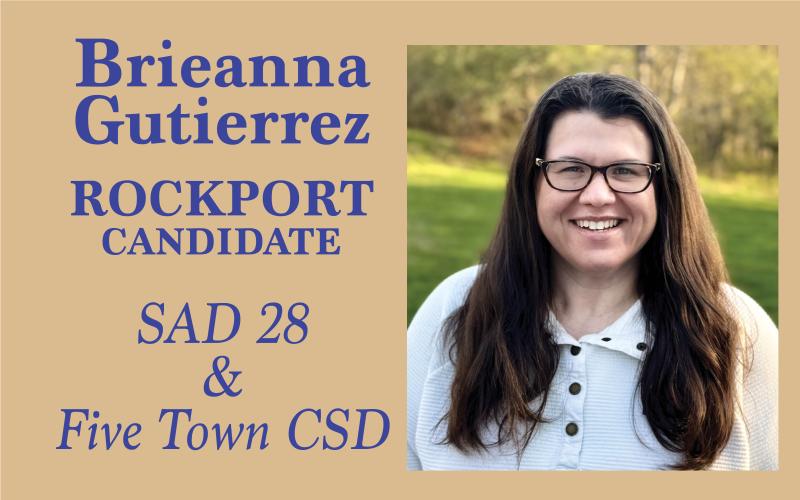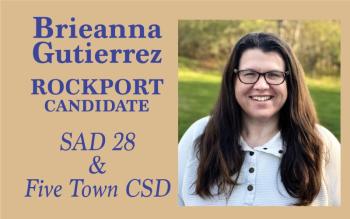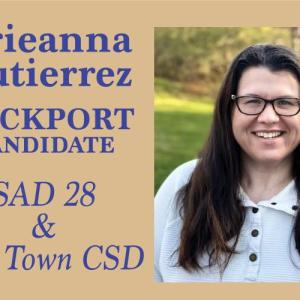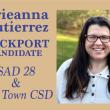SAD 28 and Five Town CSD Rockport Candidate Brieanna Gutierrez
On June 10, Rockport will vote for two candidates from a field of three candidates to serve on the School Administrative District 28 (Camden-Rockport K-8) and Five Town CSD (Camden Hills Regional High School) school boards for a three-year term. There is also an open one-year term due to the resignation of Sarah Bradley-Prindiville. Cricket Fuller is running for that seat, which will then be up for election next year for the full three-year term. The third Rockport seat is currently held by Marcia Dietrich.
PenBayPilot.com has circulated questions to school board candidates, who include Brieanna Gutierrez, Stacey Contakos and Ellen Reynolds. Here, Brieanna Gutierrez responds.
Please present a short biography of yourself.
I was born and raised in Rockport, graduating from Camden Hills in 2004. I hold a B.A. in psychology from the University of Maine at Farmington and a Juris Doctorate from Maine Law.
After law school I practiced law locally for several years before moving to Bath when I married my husband, Diego, in 2014. We welcomed our first child in 2016, at which point we really came to appreciate the importance both of being near family and raising our kids in a community deeply rooted in its commitment to high quality educational opportunities.
In 2018, when our older daughter was 18 months old, we moved back to Rockport. In the interceding years we built our forever home and welcomed our second daughter. I was first elected to the board in 2019 and have been honored to serve as vice chair of the SAD board twice, including this year.
In my professional life I’ve spent over nine years working for the State of Maine. In this role I use my education everyday as I help to guide public policy development and support the operations of Maine’s Office of Child and Family Services.
My free time is devoted to my family and loved ones, and all of our favorite things — traveling and exploring, gardening, long walks, sailing, music, cooking, and good books!
What do you hope to accomplish as a public K-12 school board member for your town?
I hope to continue to support the strength and innovation that are hallmarks of our community’s schools. While our District is strong, I also believe that we are facing the possibility of a number of unprecedented challenges around changing federal directives and funding, increasing costs, cuts to our country’s social safety net programs, and declining enrollment.
I’m grateful that our District has a long history of creative problem solving and believe that my legal and governmental experience makes me uniquely suited to supporting ongoing adaptation and innovation.
Our educators are doing an incredible job and I want to continue to support and celebrate their efforts. I think one of the best ways we can do that as a board is by seeking creative solutions and facilitating innovation to overcome whatever challenges we face. For example, declining enrollment is a very real issue right now at the elementary school.
As a district we will need to think outside of the box to ensure we are being fiscally responsible while not diminishing the quality and diversity of educational opportunities for our students or the level of support we can provide to our educators.
In my six years as a board member I’ve learned that we produce the best outcomes when our actions are grounded in our strategic plan and heavily informed by those directly impacted by the decision we are weighing. For that reason I try not to come to my role as a board member with personal initiatives or goals. Instead I want to listen to our staff, administrators, students, parents, and community members about what is and is not working and where we can strengthen our approach to education. With that feedback we can best understand how we can provide corresponding support as a board.
How do you view the role of public education in the U.S., in Maine, and in Camden and Rockport?
On a local level, schools are at the heart of our community, they are centers of activity bringing community members together in many different ways. In conversations with parents who have moved here over the last few years they have overwhelmingly voiced that our school system was a driving force in choosing to move to our community. That speaks not just to the strength of our schools as independent institutions but to the way that our school system strengthens the entire community.
At a higher level I believe that public schools help to ensure that all children have the opportunity to thrive no matter their background or that of their family. Schools support not just the academic growth of students but their social and emotional development, preparing them to be engaged and responsible adults ready to pursue whatever they are passionate about.
While in many ways I have lived a very privileged life, I’ve had the experience in my career of witnessing the vast diversity of family circumstances that exist. What I find incredible about our country’s education system (and the educators whose passion drives the system) is the way in which it aids in equalizing opportunities for children and adolescents.
Because of this unique role it is imperative that we prioritize public education and focus efforts on solutions that will have a positive impact instead of allowing ourselves to get wrapped up in the kind of polarizing political issues that have put significant pressure on public education over the last few years.
Should pre-K programs be expanded?
In a perfect world where there is ample funding for all types of early childhood care and education, including public pre-K programs, yes, absolutely. Unfortunately there are likely to be significant unintended consequences to expanding our pre-K program if consideration isn’t also given to the impact on child care providers in our community.
Child care providers depend on their preschool programs (where the required ratio of teachers to students is higher) to cover the losses they incur providing care for younger children at a reasonable cost for parents. I’ve had many conversations about this topic as a parent, as a board member, and in my professional life.
Moving to a universal public pre-K model without utilizing partnerships with or other methods to support private child care providers would have a devastating impact on the already limited supply of infant and toddler care in our community. There would also be a ripple effect on our local economy if parents were unable to go to work because they lacked access to child care.
I think as a district we should continue to explore opportunities to partner with private providers to ensure that families who would not otherwise be able to access a preschool program for their child can access affordable high-quality preschool/pre-K programming. This will safeguard the stability of our community’s child care providers, is fiscally responsible to our taxpayers, and also allows for equal footing for all of our youngest learners as they enter the school system.
Is the free meal program worthwhile and is there enough local fresh food from area farms being integrated into the meal program?
I can understand why some Mainers are frustrated by the free meal program since it requires taxpayers to bear the cost of free meals, even for children whose parents do not struggle to provide food. Nevertheless, I believe the program is well worth the investment because it levels the playing field.
Universal access to free meals eliminates stigma for children who depend on meals at school because their family struggles with food insecurity. I remember being a student in our District and having friends who felt ashamed of being on “free and reduced lunch”. Children cannot learn effectively when they are hungry and no student should go without a meal because they feel shame about their family’s financial circumstances.
During my six years on the board I have learned a great deal about just how much local food is being used in our school meals. I previously served on the finance committee and frequently signed off on financial information that demonstrated the significant effort underway in our schools to use local food.
Our food services staff have built relationships with local farms and other vendors and they are committed to creating menus that utilize food that is in season locally. This approach to our schools meals isn’t just nutritious, it is fiscally responsible (both for the school and the community) and promotes sustainability, two issues I’ve been proud to help champion in decisions during my time on the board.
Does the curriculum adequately teach all children and teens about their role in a participatory democracy?
I believe our District’s curriculum strongly supports students in learning about participatory democracy and their role in it. Our staff do an excellent job engaging with students around current affairs in an age and developmentally appropriate way.
At all levels the curriculum is designed to grow critical thinking skills and expose students to a wide array of perspectives and viewpoints. This builds empathy, tolerance, and an appreciation for the role everyone can have in creating positive change within their community.
There is no single initiative I can point to on this topic, instead the foundational principles around participatory democracy are incorporated throughout our District’s curriculum and strategic plan. The board has a role in approving proposed changes to curriculum and closely monitors implementation of the strategic plan. I am always impressed by and appreciative of the careful thought staff and administrators give to the integration of these principles throughout their work.
Should the subject of personal finance be addressed in all grades?
I think it is important for students to learn about personal finance in school. I do not see a significant need to invest instructional time towards personal finance education at the elementary level (although I would support infusion of some general concepts when it fits within the existing curriculum). But I strongly support integration of financial literacy into the curriculum at the middle and high school levels. As such, I am pleased that completion of coursework around personal finance is a requirement for graduation at the high school.
I see teaching students about financial literacy as an important part of our commitment to equity. This ensures we are preparing all of our students, no matter their background or that of their parents, to think critically about the world around them, including when it comes to finances — so they can evaluate information and make decisions that are in their best interest.
Do the Camden-Rockport schools need to strengthen the science and technology curriculum. If so, how so?
Since last year the board and school administrators have been looking closely at science testing data. What the data seems to show is that our biggest deficits in science instruction are occurring at the elementary level. Test scores in science were comparatively low at the fifth grade level, when students first entered middle school, but our students made rapid gains during their time at CRMS. I think this speaks to the strength of the project-based learning (PBL) curriculum utilized at the middle school. For example, students aren’t just learning about water quality in science, they are getting the opportunity to go out in our community’s waterways to conduct hands-on research regarding real world problems that they are interested in. This kind student-centered approach has demonstrated incredible results in terms of student engagement and advancement.
The data on science test scores helped both the board and administrators to realize that more time needed to be devoted to science at the elementary level. Carving out dedicated science time in an already packed schedule, particularly while implementing a new math curriculum and preparing to implement a new ELA curriculum represents a significant challenge.
I’m grateful for our agile and creative administrators and staff at the elementary schools who have worked hard to capitalize on opportunities to infuse science into the existing schedule and curriculum. For example, the elementary school now has a dedicated Maker Space in the Library where students have an opportunity to engage in hands-on learning that involves experimentation and exploration.
I have also been proud to see how our District’s commitment to outdoor education is helping to create exciting learning opportunities by allowing students to explore science themes through nature. Whether that’s investigating downstream impacts when activity occurs upstream in the stream behind the school or exploring the impact of direct sunlight and shade on temperature by taking temperature readings in various locations on school grounds, the opportunities abound.
I have witnessed firsthand through my daughter’s learning the incredible commitment of our staff to capitalizing on these types of real world opportunities that are key to advancing our students’ knowledge of science concepts.
With regard to technology, our school system is currently in the process of adopting comprehensive technology standards that recognize our students as digital citizens and seek to empower them to use technology to aid in learning.
These standards include age/grade level expectations for the use and integration of technology in classrooms. The curriculum committee is currently finalizing this work but I appreciate the fine balance they have sought around minimizing the use of technology for our youngest students (who we know learn best in a more experiential and play-based manner) while thoughtfully increasing the integration of technology as students move up through the grade levels.
Development of these standards is reflective of the way in which our schools are constantly seeking opportunities to improve and refine curriculum to meet the needs of our students in a rapidly changing world. I am grateful for the time and energy staff, administrators, board members, and community members have devoted to this work.
What is your opinion of book-banning in public school libraries? Are there any books you want pulled off the school library/classroom shelves?
I trust our District’s staff to choose the material available in our libraries and do not support banning or removing books from schools. I think diversity (of all types) in the materials we make available to our students is of great importance to making them good citizens.
Students learn valuable critical thinking skills when they are able to read about and evaluate different perspectives and experiences. Making these differing perspectives and experiences accessible through literature is of particular importance given that our community sometimes lacks diversity.
I also believe that an individual’s beliefs should not be unduly forced upon others. Parents can and do opt their children out of portions of our curriculum when they have concerns, but to apply blanket prohibitions on certain books or topics in schools impacts all students, not just those whose parents are concerned.
I strongly believe that politics should not impact our willingness and ability to provide comprehensive high-quality educational opportunities for our students. In my experience, book bans are almost always directly related to partisan political debates that should not have a role in our school’s curriculum.
Maine’s position on transgender athletes participating in girls sports has resulted in a federal suit against the Maine Dept. of Education. How should the state respond?
I find it deeply unfortunate that instead of focusing on issues of real importance like improving educational outcomes for all children, addressing the crisis around youth mental health, or helping our schools and educators to best assist students adapt to rapidly evolving technology, we are spending time and energy on the issue of transgender athletes.
The law in Maine (the Maine Human Rights Act) is clear that students cannot be discriminated against on the basis of gender identity. Sports help our young people stay strong physically and mentally, they teach them about teamwork and collaboration, and they represent a meaningful opportunity to keep kids engaged.
I support the ability of all students to participate in sports. Research shows that tansgender youth struggle with mental health issues at a rate that far outpaces youth who do not identify as transgender (for example, one study found that 80% of transgender youth have considered committing suicide). If a sport helps even one transgender student find belonging, meaning, and acceptance that’s something we should be celebrating instead of politicizing the life of a minor.
As a board member I will continue to advance a focus on issues of real importance, instead of being waylaid by “red herring” issues like this.
Should the schools adopt a phone-free policy?
I support a phone-free policy for all three of our schools. I also support an intentional approach to the use of technology in educational activities, particularly with our younger students.
I read The Anxious Generation as part of our community book read last school year and gained important evidence-based touchpoints that have helped me to contextualize what previously had been my more generalized concerns about the role of technology in the lives of children (my own included).
Removing the distraction of phones allows students to focus on learning and engagement with peers. These are core functions of our school. I want to recognize the efforts of our administrators who have facilitated conversations with students, staff, and community members around this issue over the last year. I am grateful to those who have participated in those conversations as they have helped me as both a board member and a parent to learn about a variety of perspectives on the topic.
In the recent process of ratifying the phone-free policy I did encourage our administrators to think carefully about what solution our schools adopt to effectuate the phone-free policy as I think students and community members have raised important questions about the most effective solution.
Camden and Rockport are low-receiver towns, in the eyes of the state, resulting in minimal state funding aid. How will you, as a board member, help reduce the fiscal load on the taxpayer to fund education and maintain the facilities?
I cannot think of a better investment of taxpayer dollars than the education of our community’s children. There is a vast array of research on the long-term benefits (both fiscal and otherwise) to investing in programs that support the healthy development of children.
As a board member I take my responsibility to ensure financial accountability seriously. Throughout my time on the board I have consistently appreciated that our administrators are similarly committed to balancing the quality and depth of educational opportunities available in our schools with fiscal responsibility to our taxpayers.
I think our District’s dedication to seeking creative solutions has resulted in significant fiscal benefit to our community. For example, our District has utilized our status and reputation as a high quality school system to grow revenues from students that live outside of our District who pay tuition to attend our high school. Another example is the solar farm project our District invested in which decreased the environmental footprint of our schools while also netting cost savings for our taxpayers.
As a board member I have also been grateful for our District’s detailed and thoughtfully crafted strategic plan. Personally I have been able to use the plan as a guiding document when the board considers competing budgetary demands. The plan allows all stakeholders to be on the same page about our goals and makes the process of determining where and how to utilize and prioritize funding much more straightforward.
Financial support for our schools represents over 50% of property tax bills in our community. The tremendous weight of that responsibility is felt by both the board and the administrators in our District. The time and effort that goes into crafting our budgets is enormous and we ensure there are multiple pathways for the community to learn about and have input on the budget.
As a board we depend on engagement from community members. Their perspective is of critical importance to me as an elected representative who is tasked with considering how to ensure fairness for taxpayers while also doing what is best for our students and staff. I would strongly encourage anyone with concerns or questions about the fiscal state of our schools to engage with the budget process that happens each year in late winter and spring. Personally, I am always grateful for citizen participation, regardless of the perspective, as this input helps me be the best representative possible for our community.
What books are you reading these days, and which do you recommend others read?
I almost always have at least one travel guide on my bedside table. I love reading about new places, taking notes, and dreaming of/planning for future adventures.
Currently I am also reading Careless People by Sarah Wynn-Williams who previously worked as an executive at Facebook. The concept of social media was just developing as I was entering adulthood and for me this book has offered an opportunity to reflect on social media’s evolution and its impact on society. It has also allowed me to take an important step back and examine the role of social media in my life and how I want to use it in the future. I would recommend Careless People to anyone who uses social media, and in particular those interested in the evolution of social media and the role it plays in society.
Anything else you’d like to address? Free space!
First, I want to thank the individuals who are truly at the heart of our schools and who play a large part in the strength of our community’s education system — our incredible teachers and staff.
As I was crafting my responses to these questions I found myself continually reminded of my gratitude for them. From teachers to bus drivers, custodians to coaches, support staff to food services workers, substitutes to administrators, every one of them plays a part in supporting our vibrant, dynamic, high-quality, and engaging school system. They meet students where they are, ensure they feel belonging, help them navigate challenges, and support them as they find their own path to success.
Some might call my responses to these questions “comprehensive” but I’m self-aware (and humble) enough to recognize that I struggle with my own deep consideration of issues and resulting “wordiness”. I am grateful for any and all readers who have made it to this final question!
Ultimately I hope my deep familiarity with our community, my professional and personal knowledge around governance and education, and my unbridled passion for our schools has shone throughout these responses. I hope I have cemented your vote to re-elect me as a Rockport representative to the school board, but regardless of who you vote for in June I hope that you make time to vote (absentee or in-person) on June 10!



























